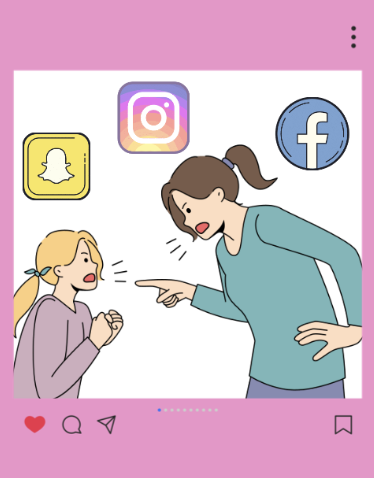A world where social media requires a parent’s physical consent: Welcome to Utah

Designed by Felicity Whidden on Canva
A controversial Utah law that puts tighter restrictions on social media use among teenagers is an invasion of privacy.
April 11, 2023
When I first came across talk about a law requiring the consent of a parent for minors to have social media accounts (via the Daily Mail podcast), I was sitting in the passenger seat of the car looking at my mom’s skeptical face–and then instantly matching it–before we both said in unison, “Uh, yeah, no.”
As a student, the new Utah Social Media Parent Act raises several concerns about online privacy and digital rights. The act, which requires proof of consent from a parent (i.e., driver’s license photo, etc.) and the ability for schools to notify parents if a student is involved in any disproving activities on social media, has won the hearts of many parents, but, in the eyes of those being “protected” many kids, in turn, feel punished.
While this is only a Utah-based law, this parent-popular ruling could spread to other states like Illinois and cause more kids to lose access to online communities and groups that do much more good than harm.
While the act may protect students from cyberbullying and other online dangers, it raises questions about how much control parents should have over their children’s online activities. Many students use social media in often unimportant ways (like the endless scroll of satisfying cake-icing videos that makes clicking away utterly impossible), but other teenagers use these platforms as ways of expressing themselves, sharing personal experiences, even making money, and in case of some, seeking out groups or platforms to aid in tough situations.
One student here told me that social media she would “feel so alone. My parents also don’t know [about my sexuality], so online communication is just better for me, too, for now”.
If parents had access to this–sometimes very personal– information, many kids would feel stuck as these important outlets would be seized. Online platforms and group chats have been wonderful ways for kids to participate in communities where they can engage without face-to-face interaction and, in many cases, parent intervention. With this new law, many kids will feel violated by important resources.
Furthermore, the act may have unintended consequences, such as encouraging more secretive and potentially harmful online behavior. If these “parent signatures” are denied, many kids will find workarounds promoting harmful strategies to get hold of what they want.
On a personal note, I have used many platforms to advertise my small business, and, sorry, Mom, but if I were not allowed an Instagram for my jewelry company, I would probably steal your license (or at least debate stealing it) and forge the parent consent form to get an account anyway. Many students like myself who run small businesses rely on social media to communicate with customers and get products noticed by larger audiences. Many of these entrepreneurs (once again, like myself) are under 18, and this law could be detrimental to an otherwise stable income.
Overall, while the new Utah Social Media Parent Act may have good intentions, it is important to consider the potential impact on students’ rights and privacy online. It is crucial to have open and honest conversations with parents and educators about digital safety and responsible social media use rather than relying on potentially invasive and harmful legislation instead.







Jason • Apr 13, 2023 at 3:49 pm
If this bill becomes law nationwide, the only sites that won’t require a photo ID will be porn sites, funnily enough.